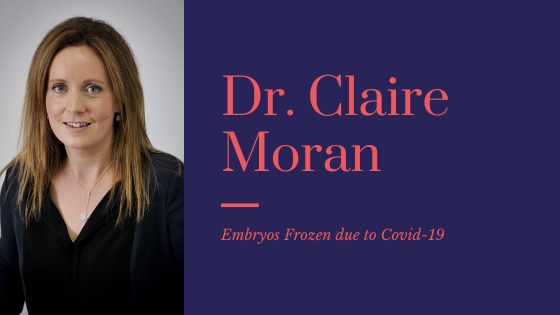
In light of CV-19 Dr. Claire Moran discusses some of the questions we have received this week to reassure you that embryo freezing is safe and offers the same chance of success in the future as a fresh embryo transfer.
The impact of the coronavirus pandemic has posed huge challenges across the globe. This rapidly spreading virus has affected all our lives and in the past few days it has forced the lock-down of our fertility services. As an embryologist I have worked through many natural disasters, but Covid-19 is on another level to anything that has come before. On 14th March the European Society of Human Reproduction and Embryology (ESHRE) issued guidelines for all fertility clinics in relation to how to deal with the threat of Covid-19. One of these guidelines specifically stated that all patients having treatment should have their embryos frozen in order to avoid becoming pregnant at this time. At Repromed these guidelines were taken very seriously, and we made the decision to immediately suspend most of our services. Difficult phone calls were made and tears were shed (on both sides of the phone) but the safety of our patients and staff was our number one priority.
When the news arrived, we had many embryos in our laboratory at various stages of development. They were busy dividing, oblivious to everything that was going on in the world. Their fate, for now had been decided by a higher authority. The decision was made to freeze all embryos, suspend them in time, until all this passes and life returns to normal. As embryologists, freezing embryos is a daily occurrence however this is planned with patients. Suddenly we were offering this as the only treatment option. For this reason, I would like to address some of the questions we have received this week to reassure you that embryo freezing is safe and offers the same chance of success in the future as a fresh embryo transfer.
Q1: What is a Frozen Embryo? When embryos reach Day 5 of development, they are called a Blastocyst. At this stage the embryos are frozen in the lab. This is a very precise and delicate process called vitrification. At the end of the process each embryo is in a suspended state. They are no longer dividing or developing, and they are stored at -196 degrees Celsius.
Q2: Will the length of time in storage affect the embryo? No. Embryos are frozen in a suspended state at a very low temperature. Worldwide, embryos have been thawed after more than 20 years in storage and have produced healthy babies.
Q3 What are my chances of success with a Frozen Embryo Transfer? At ReproMed almost 50% of our embryo transfers are frozen embryo transfers. For January and February 2020, we have identical success rates when we compare fresh and frozen embryo transfers. 58% of our patients had a positive pregnancy test after embryo transfer, regardless of age or fertility factor.
For the moment we can assure you that your embryos are safe, and we look forward to resuming treatments as soon as possible.
Dr Claire Moran
Laboratory Manager













